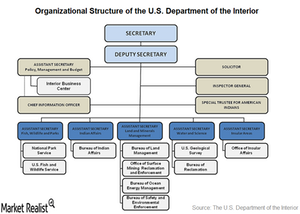How Does the Land Ownership Pattern in the US Affect Miners?
Land ownership in the US can be broadly divided into the following categories: federally owned land, state-owned land, privately owned land, and Native American land.
Feb. 9 2016, Published 2:45 p.m. ET

Land ownership
Laws and regulations are specific to the type of land on which mining takes place. Land ownership in the US can be broadly divided into the following categories:
- federally owned land
- state-owned land
- privately owned land
- Native American land
According to the Congressional Research Service’s (or CRS) report on federal land ownership, the federal government owns about 28% of the 2.3 billion acres of land in the United States.
Federal lands
Federal land is chiefly confined to the Western part of the country and Alaska. The Bureau of Land Management (or BLM), the Fish and Wildlife Service, the National Park Service, and the Forest Service together administer about 95% of federal land.
Native American land is managed by the Bureau of Indian Affairs (or BIA) rather than individual states.
According to the U.S. Bureau of the Census, more than 60% of total land in the US is privately owned. Most of the land in the Eastern part of the country falls into this category of ownership. State governments own about 9% of the total land.
Major coal (KOL) mining companies like Peabody Energy (BTU), Arch Coal (ACIIQ), Cloud Peak Energy (CLD), and Alpha Natural Resources (ANRZQ) lease and operate mines on federal lands.
How do coal mining companies obtain a lease on federal land? We’ll look at this question in the next part of this series.
